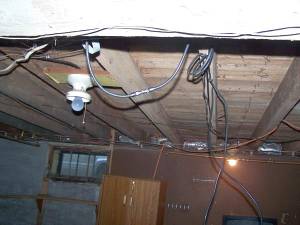A tenant’s nightmare
By Gail Geraghty
Staff Writer

MUSHROOMS AND MOLD — Judy Crowell said she took this picture of fungi growing in the basement of 16 Walker Street in Bridgton, caused by burst pipes before she moved in. Crowell said her landlord, Nelson Henry, promised to clean up the basement, which was filled with former tenants’ belongings that got wet, but never did. A judge ruled in her favor when Henry took her to court for refusing to pay rent, saying Crowell had proven that the home was “unfit for human habitation.â€
Judy Crowell, a projectionist at the Magic Lantern Theatre in Bridgton, said she lived through a nightmare for nearly a year after foolishly agreeing to rent the house at 16 Walker Street in Bridgton, with her 17-year-old daughter and a friend, in October of 2009.
The cellar was a sodden mess from pipes that had burst before she moved in, soaking the discarded belongings of former tenants. The stove and refrigerator didn’t work, and she had to use her own money to replace the appliances. Her landlord, building owner Nelson Henry, promised her he’d clean up the basement and repair the appliances, and she believed him.
She wishes now that she hadn’t been so understanding.
Henry, for his part, said it was Crowell who “let things slide,†and that she was “painting a pretty bad picture†of conditions at the home. He said he had a reliable maintenance man at that time who tried to respond to her concerns. “Judy was actually a pretty good occupant at first, but the last few months got weird,†Henry said.
Conditions at the home just got worse, Crowell said, to the point where sewage began backing up in the bathtub because of a clog in the drain. Henry’s answer was to unhook the piping for the weekend and then not tell her about it, she said, which dumped raw sewage into the cellar when she flushed the toilet. Her brother-in-law, an electrician, discovered that an extension cord was being used to connect wiring in the walls, and that the porch light didn’t always work, suggesting faulty wiring.
“Nelson told me he was going to fix everything,†Crowell said, and as a single working mom, the idea of packing up and moving again was just too overwhelming. “So I kept waiting, and doing things on my own,†she said.
Crowell said she took 10 truckloads of dirty, wet junk from the cellar to the dump, and avoided the cellar as much as she could. “It was so disgusting to me. It smelled, even at the beginning.â€

QUESTIONABLE WIRING — was in the basement of 16 Walker Street in Bridgton, when Judy Crowell lived there from October of 2009 to the summer of 2010. “The wiring was all over the place and would hit us in the face when we walked downstairs,†she said.
She had Code Enforcement Officer Robbie Baker and Fire Chief Glen Garland come inspect the house, and she said they told her to arrange for an electrician to make electrical repairs. “I don’t understand why the CEO couldn’t have taken more action,†said Crowell.
Baker was on vacation this week and was unavailable for comment.
Crowell also called the State Fire Marshal’s office, and was told someone would come to look at the house. “Things happened, and he never came out,†she said.
Finally, after the sewage backup incident, she’d had enough. She stopped paying rent in April, 2010, and, in August of that year, Henry took her to court in order to have her evicted.
Crowell turned the tables on Henry, showing up in Bridgton Ninth District Court with photos that convinced Judge Keith Powers that the house was “unfit for human habitation,†under the Maine landlord-tenant law. But because the court was hearing an eviction proceeding, the ruling applied only to the status of Crowell’s tenancy, and not to laws governing habitable property. Crowell was excused from paying rent, and she moved in with her mother in Harrison soon after.
Crowell said she consulted Pine Tree Legal Services, and considered filing her own lawsuit, but decided against it once Henry began eviction proceedings. Proving a place is unfit for human habitation is “really hard to do,†said Crowell, and would take money and time she did not have. She said, at first, the judge didn’t want to listen to her reasons for not paying rent, but once he did listen, she said, “He was mortified at what I had to live with.â€
Crowell is aware some people might shake their heads and wonder why anyone would move into a house with so many problems, or stay there for any length of time with the problems unaddressed. To that she said, “I was a single mom, paying just about everything I made for rent. It’s hard. It’s really difficult. Living there was just ridiculous. I don’t think he could ever pay me what he owed me in terms of distress.â€

